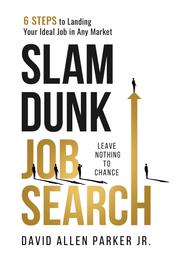“Before you start to compete for your ideal job, you should know where you stand relative to the marketplace,” writes Parker in this extended game plan for understanding and improving the process of job seeking. “You should know what you want to offer, but you also must know how well you match up with what the market demands.” The author goes on to explore how readers can assess and improve their own marketability. He takes this same 360-degree view of the other elements of the job search process, seeking to instill in his readers the “limitless mindset” that will be the key to getting the positions of their dreams. Parker steers readers through every aspect of the process, from the nitty-gritty of how to arrange items on the printed pages of their resumes to the crucial elements to study in the companies they’re hoping to join. He understandably devotes a good deal of space to what’s typically seen as the most important aspect of the job search: the interview. When discussing interviews, for instance, he has a good deal of advice for readers, all based on remembering that they’re selling themselves and their credentials the whole time. The potential employer, he stresses, is quite literally your customer—and he warns of potential bad signs an applicant could be giving off: not being very accommodating when scheduling an interview, asking irrelevant questions (or questions that your own research could easily have answered), and talking too much and thus displaying an unwillingness to listen. He fleshes out all of his points with anecdotal examples designed to make them more identifiable.
Parker’s greatest strength is the sharp, forceful tone he employs throughout. Job seekers are bombarded on all sides by advice on how to improve their resumes, increase their charisma in interviews, and enhance their skill at reading the personalities of their possible future employers. The last thing such readers need is a wishy-washy approach, and the author avoids the equivocal completely. He provides his readers with graphics, bullet points, pull quotes, and the like, all geared, as his prose is, to convey the maximum amount of useful information in the clearest possible way. The author sympathizes with job seekers, presenting them the fruits of his research and experience on such points as reaching out and making personal contact with potential employers when possible (“Don’t merely rely on your credentials to land you a job”). But he’s also firm with readers, warning them against some of their own possible shortcomings, things job seekers tend to do without thinking about the images they project. “Inconsistency will put doubts in the hiring manager’s mind,” he writes. “It can be the one piece of information the employer uses to decide between top candidates, especially when employers are hypersensitive to anything that will allow them to make a quick decision with limited information.” At every turn, he’s trying to arm his readers with ways to avoid giving hiring managers “easy ways out.”

